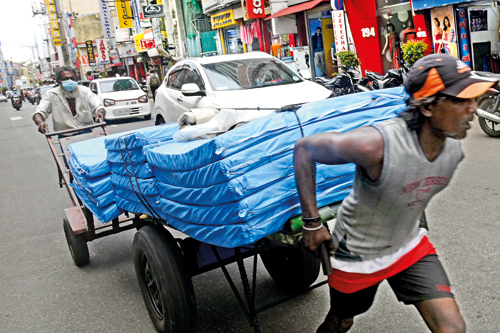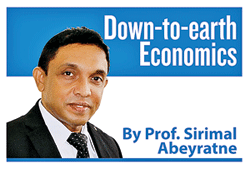Lavish tax shock to middle-class
View(s):
Natamis or street workers may be among the few categories of workers who are not taxed.
Ranjan works in a private company in Colombo and holds a managerial level position and thus belongs to the “middle-class” income category in Sri Lanka. He started off his career 28 years ago and acquired both professional qualifications and working experience to receive his promotions to managerial level.
He used to travel daily from his home in Gampaha to the office in Colombo in his private motorcar, which was bought a few years ago through a vehicle loan from the company. Although travelling daily about 25 kilometers was costly and stressful, it was easier and convenient as his two children could also travel with him for their studies.
It was this week that most of the employees working in both public and private sectors received their salaries for the month of January. And it was the first salary that has been subject to the new tax schedules. As it became a shocking week for the middle-income earning employees, I thought of elaborating Ranjan’s story, which may be the story of at least a few hundred thousand.
Tax shock
After receiving his salary pay slip for the month of January, he was shocked! His take-home salary has been reduced to just Rs. 68,000, although his taxable six-digit salary was reported as Rs. 345,000 which includes fuel and telephone allowances. Non-cash benefits such as fuel, telephone and insurance are also subject to taxes from his salary, while he has been pushed up to the highest tax bracket of 36 per cent. As a result, his tax deduction was recorded as Rs. 52,000 – about 10 times the amount of tax he paid last month, December 2022.
Earlier as income tax was applied on incomes more than Rs. 250,000 a month, his taxable income was just Rs. 95,000 for which the minimum tax rate was applied. As per the new tax schedules, incomes above Rs. 100,000 are subject to income tax so that Rs. 245,000 out of his salary is taxable. And with that income level, the highest tax rate of 36 per cent is also applicable.
Total deductions of Ranjan’s salary include his EPF contribution, personal loan, vehicle loan from the company and, the housing loan from the bank. The sharp reduction in take-home salary was not only due to the new taxes, but also due to increased interest payments for his housing loan since last year. He got his 20-year housing loan at 9 per cent interest rate, which has now been adjusted by the bank at 15.5 per cent due to the interest rate hike.
He could not figure out how to manage his household expenses for four persons of his family for one month with a Rs. 68,000 take-home salary. He had already stopped using his private vehicle due to higher petrol prices, which increased about three times. Instead, he shifted to travel by train while the two children used buses.
Managing monthly expenses
Although he started to buy second class tickets for the train, his stress level too increased for two reasons: The first is the quality and discomfort of travelling by train even though he travels second class. The second is the permanent free-travellers in the train who occupy even the second class seats so that Ranjan as a rightful train passenger has no seat. He came to know that it is still cheaper for some people to travel daily without tickets and to pay a “small” fine occasionally if it happens at all.
 Now he has another reason to get angry: Even after paying so much taxes why can’t the government give him a better public transport facility? After watching many vehicles with security officers escorting some of the politicians, he wondered whether they also pay taxes for their “non-cash benefits” – vehicles, drivers, escort staff and other facilities.
Now he has another reason to get angry: Even after paying so much taxes why can’t the government give him a better public transport facility? After watching many vehicles with security officers escorting some of the politicians, he wondered whether they also pay taxes for their “non-cash benefits” – vehicles, drivers, escort staff and other facilities.
According to personal income tax schedules, an employee who receives official housing, official vehicle, drivers and other staff, telephones, insurance, water, electricity, gas, airfare, hotel bills and so on, are all taxable non-cash benefits. In fact, it seemed to him that there is no sense of the country’s economic crisis for some people, whose living and lifestyles have not changed.
More than half his take-home salary is now required to pay for his children’s public transport cost as they also had to give up travelling in their father’s motorcar. Electricity cost has doubled too, although people don’t have electricity throughout the day; and it is scary to think about another increase in electricity bills.
Throughout the last year 2022, he saw his monthly expenses skyrocketing so that the real value of his six-digit company salary was fast deteriorating. The salary is now worth less than half of what it was a few years ago.
Permanent income hypothesis
As per the “permanent income hypothesis” that economic students learn in their macroeconomic lessons, consumers get used to spending according to their long-term average income levels. This means that people belong to different income levels for their living and lifestyles that suit their income levels.
Accordingly, a person who used to earn Rs. 345,000 a month on average has already formed particular spending patterns: He has built a house and bought a motorcar as he can afford it. He feeds his family and raised his children according to that income level.
Suddenly, he falls down to a level that he cannot bear and tolerate. Real value of his money income has deteriorated by more half, as the price of his living and lifestyles have skyrocketed. On top of all that, the overnight increase in his tax payments has increased about 10 times! The crisis and the policy measures to deal with the crisis have hit the middle-class more than the low-income class or the high-income class.
After working nearly three decades, Ranjan has saved his EPF contribution that he receives at his retirement. Only after he gets it, he will realise that the value of all his lifetime saving has already been wiped out by more than 50 per cent!
From foreign friends
One of the major problems with respect to taxation that the country has faced is the “narrow income tax base”. There are about 500,000 taxpayers in the country out of a few millions of people who also otherwise earn taxable incomes. As I elaborated in this column last week, it is not only a source of equity and efficiency problem of taxation, but also a source of frustration and resentment of people who pay taxes.
Among many readers who sent me compliments after reading the column, there were two foreign friends too – one person from Germany, and the other from Canada. They both commented about the income tax problem of Sri Lanka, providing comparisons with their own systems.
The Canadian friend said that, as far as he can understand, many Sri Lankans don’t pay taxes, just like many people in Greece! The German friend explained how the income tax system is so efficient in Germany as “taxation at the source income” and, then the annual adjustment for over-payments or under-payments; those people who have over-paid, will get it back, while those who have under-paid will have to pay the balance again.
The bottom line is that the government knows people’s income and wealth. In Sri Lanka there is no operational mechanism established for tax administration so that the government doesn’t know people’s income and wealth. The result is that, while many people don’t pay taxes, just a few hundred thousand people pay taxes.
(The writer is a Professor of Economics at the University of Colombo and can be reached at sirimal@econ.cmb.ac.lk and follow on Twitter @SirimalAshoka).
Hitad.lk has you covered with quality used or brand new cars for sale that are budget friendly yet reliable! Now is the time to sell your old ride for something more attractive to today's modern automotive market demands. Browse through our selection of affordable options now on Hitad.lk before deciding on what will work best for you!


